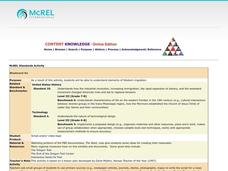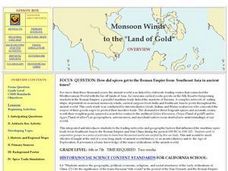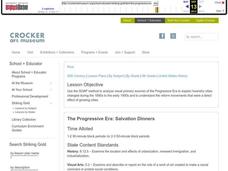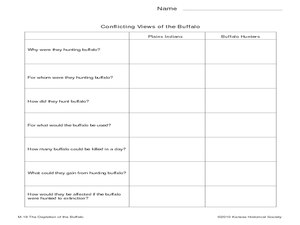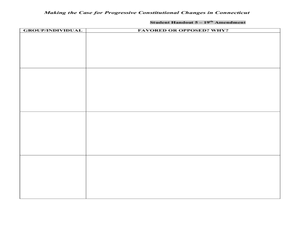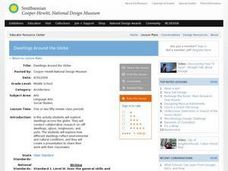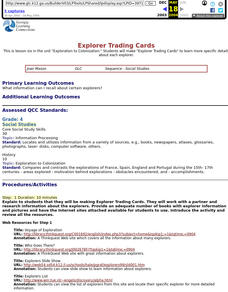University of Wisconsin
Analyzing Presidential Campaign Propaganda
Campaign propaganda has evolved from 1952 through the presidential election of 2008. A social studies activity prompts class members to analyze the devices used in ads and political cartoons, noting strategies they believe would work to...
Curated OER
Daily Life in the Fur Trade: Communications & Resourcefulness
Student complete a number of activities using computer based resources and primary sources to research the fur trade. They answer questions using the computer research.
Curated OER
Westward Ho
Middle schoolers examine primary sources regarding Western migration. For this Manifest Destiny lesson, students determine why the pioneers moved west and what the trip was like as they examine sources and write journals based on their...
Curated OER
Student Newspaper Project
Writing teaches us so much. One can identify the many characteristics of a newspaper, use the Internet to gather information, and communicate with others. Primary students create a class newspaper for publishing and dispersal.
Curated OER
Monsoon Winds to the "Land of Gold"
Students recognize environmental factors that influenced maritime trade routes and the establishment of major trading centers in classical times. They evaluate perceptions of the ancient world through ancient maps and primary source...
Curated OER
Service Projects in the Dominican Republic
High schoolers read primary source documents and identify several kinds of service projects conducted by Peace Corps Volunteers; young scholars identify criteria used by the Peace Corps for conducting service projects for the common good.
Curated OER
Service Projects in the Dominican Republic
Students look into how Peace Corps Volunteers have provided community assistance in the Dominican Republic. They read primary source documents and be able to identify several kinds of service projects conducted by Peace Corps Volunteers.
Curated OER
The Progressive Era
Eighth graders utilize the SOAP method to analyze a work of art and relate it to what they know about the Progressive Era and the reasons why cities changed and the ways in which cities changed during the end of the 19th century. They...
Curated OER
Clues From the Past: Daily Life
Students discover the ways different cultures gathered and made food. In groups, they read excerpts from primary sources about the food people in Mesopotamia liked to eat. They work together to make a batch of goat stew and a loaf of bread.
Curated OER
New Deal Programs: Brother, Can You Spare a Dime?
Students research New Deal programs. In this Great Depression lesson, students analyze primary sources to develop an understanding of the effects of the depression and how WPA programs and other New Deal programs impacted people's...
Curated OER
The Depletion of the Buffalo
Seventh graders consider different cultural viewpoints. In this Kansas history instructional activity, 7th graders examine the depletion of buffalo as a contention point between Native American and European settlers. Students read diary...
Curated OER
Lattimer Massacre: What's Beneath the Surface?
Middle schoolers research the growth of unions due to issues related to the Lattimer Massacre. They research primary source documents and create posters, skits and role plays.
Curated OER
Commemorations Across Cultures
Students explore how different cultures commemorate people and events. They research how commemorations are created through music, painting, sculpture, photography, architecture, and poetry. In collaborative, students create a...
Curated OER
Making the Case for Progressive Constitutional Changes in Connecticut
Students take a closer look at Constitutional Amendments. In this Progressive Era lesson, students discover how the amendment process works and then examine 4 amendments proposed during the era in Connecticut. Students research primary...
Curated OER
Dwellings Around the Globe
Students explore dwellings around the globe and conduct collaborative research on cliff dwellings, igloos, longhouses, and yurts. They then explore how different dwellings reflect environmental and cultural conditions, and they create a...
Curated OER
Stating Your Case: Writing Thesis Statements Effectively
As a writer, if you have a weak introductory paragraph or thesis statement, you might lose your audience! Have your middle and high schoolers practice writing introductory paragraphs that include clear thesis statements in response to...
John F. Kennedy Presidential Library & Museum
Military Advisers in Vietnam: 1963
How did the beginning of the Vietnam War factor into the Cold War with the Soviet Union? As part of a study of American involvement in Vietnam, class members read a letter address to President Kennedy and his response in which he...
Curated OER
Explorer Trading Cards
Fourth graders make Explorer Trading Cards. They work with a partner and research information about the explorers.
Curated OER
Lesson: Double Album: The Collection and the Archive
An open discussion starts this activity off. The class takes a critical look at five works of art that demonstrate the impact and purpose of identity through collections or archives. They then write a list or draw 10-15 items found in...
iCivics
Drafting Board: Interest Groups
Does the influence of interest groups harm a political system? Your class members will analyze the role of interest groups in American politics, as well as consider the effect of perspective, bias, loyalty, and the First Amendment.
Mr. Roughton
History Mystery: The Black Death
Was the medieval Black Death the same disease as the modern bubonic plague? Your class members become the top investigators in the case, examining a variety of exhibits (i.e. disease descriptions, sample historical letter, map, etc.) in...
NOAA
Communicate!: Create a Unique Message About Climate Change
Scholars use their communication skills to express their take on climate change in the ninth installment of the 10-part Discover Your Changing World series. They create ways to deliver their messages on a specific aspect of climate by...
Facing History and Ourselves
Taking Ownership of the Law
The work of building and maintaining a democracy is, in the words of Justice William Hastie, "never finished." To better understand what Hastie sees as an ongoing building process, class members listen to a seven-minute podcast about two...




